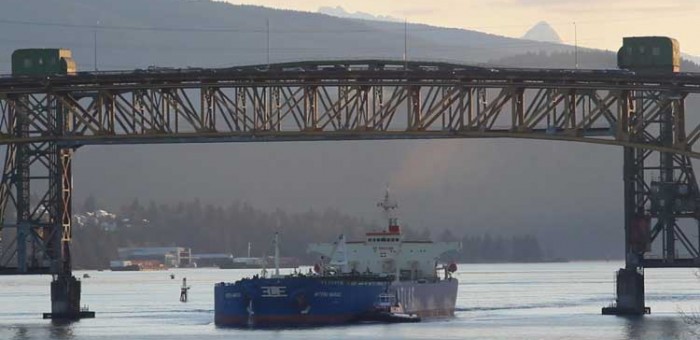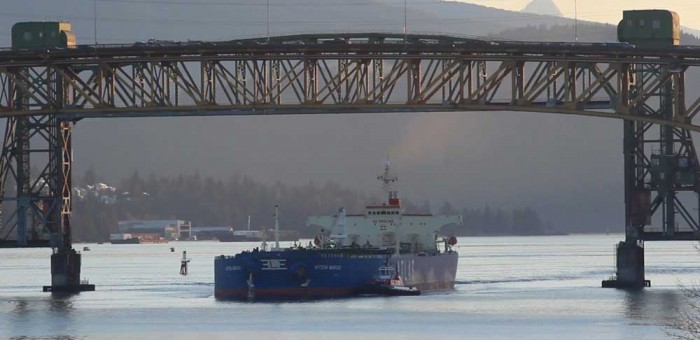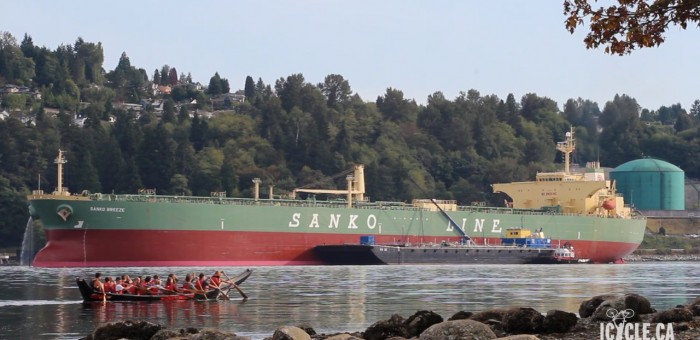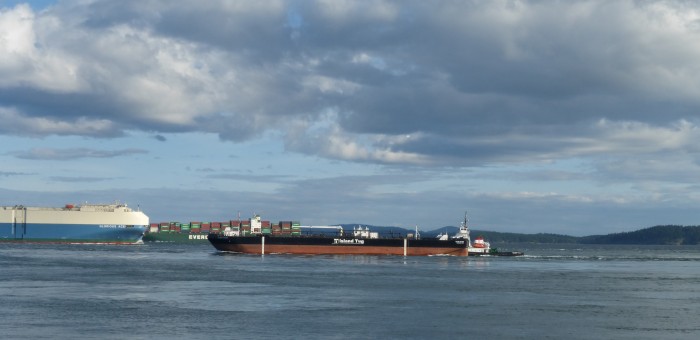Kinder Morgan
NEB Ruling on Adequacy of Trans Mountain’s Answers Deeply Troubling
Media Statement: October 1, 2014
National Energy Board Ruling on Adequacy of Trans Mountain’s Answers Deeply Troubling
For Immediate Release
Victoria B.C. – Dr. Andrew Weaver, MLA for Oak Bay-Gordon Head and Deputy Leader of the B.C. Green Party is calling the National Energy Board’s ruling on the adequacy of Trans Mountain’s answers “deeply troubling”.
After weeks of anticipation, the National Energy Board handed down its ruling on the adequacy of Trans Mountain’s answers to intervenors’ first round of information requests on the details of the pipeline proposal. Roughly 50 intervenors challenged more than 2,000 responses that they were given by Trans Mountain on the basis that those responses were incomplete and inadequate. In the end, the NEB ruled in favour of only a very small fraction (less than 5%) of intervenors’ requests for better answers.
“In the case of my submission, I challenged more than 100 incomplete and inadequate answers,” says Weaver. “To be clear, I wasn’t challenging answers that I disagreed with. I was challenging answers that simply did not respond to my questions. Yet despite this, the National Energy Board still only ruled in my favour four times.”
As a part of the first round of information requests, Dr. Weaver submitted nearly 500 questions on a variety of topics, including the risks and impacts of a potential oil spill, Trans Mountain’s ability to clean up such a spill and the extent to which the public on Southern Vancouver Island was consulted about the pipeline proposal.
One of Weaver’s key areas of concern is the apparent contradiction arising from land-based tank experiments conducted by Trans Mountain and those undertaken independently by the federal government. According to a federal government report published in November 2013, diluted bitumen has the potential to sink when it mixes with suspended sediments. Trans Mountain’s experiments were conducted in the absence of suspended sediments. “One thing we have no shortage of in our coastal waters is suspended sediments” notes Weaver. “Next time you travel on a BC ferry from Swartz Bay to Tsawwassen, have a look at the water. Water originating from the Fraser River has a very distinct milky colour associated with its high sediment content.”
Identifying whether or not diluted bitumen sinks is essential for determining whether or not we have the capacity to respond to a spill. BC government reports have made it clear that we currently don’t have the capacity to respond to a submerged oil spill and Trans Mountain has not proposed any measures to address this gap.
In its ruling, National Energy Board concluded that Dr. Weaver’s attempts to address the contradictory evidence “would not contribute to the record in any substantive way”.
“That the NEB can say that questions on the science underpinning whether Trans Mountain can even respond to an oil spill are not a ‘substantive’ contribution to the record should be alarming for all British Columbians,” says Weaver. “This is an unfortunate ruling that puts our coastline at unnecessary risk. In the absence of an opportunity for cross-examination, it is decisions like these that make people seriously question the integrity of the entire hearing process.”
-30-
Media Contact
Mat Wright – Press Secretary, Andrew Weaver MLA
Mat.wright@leg.bc.ca
1 250 216 3382
Trans Mountain’s Oil Spill Economics
This post is part of an ongoing series in which MLA Andrew Weaver will be sharing key information from inside the National Energy Board hearings on Kinder Morgan’s Trans Mountain pipeline proposal. To see previous posts, please click here.
Trans Mountain’s Bold Claim
While reading through Kinder Morgan’s Trans Mountain pipeline application, my team was astonished to come across what has become one of the most talked about quotes from the entire 15,000 page application.
In discussing the impacts of oil spills, Trans Mountain tells us that “spills can have both positive and negative effects on local and regional economies.” Taking that point even further, they say that “spill response and clean-up creates business and employment opportunities for affected communities, regions, and clean-up service providers”
As you might predict, it didn’t take long for national and international news outlets to pick up on these quotes and for Trans Mountain to backtrack on their claims. According to them, the quote was taken out of context.
Given the serious and legitimate concerns we have about oil spills on our coast, I thought it was important to find out more about how Trans Mountain evaluated the potential economic impacts of a spill.
Requesting Trans Mountain’s Analysis
Now, let me first say that no economic benefits can justify the environmental catastrophe that a spill would cause. So many of our lifestyles, livelihoods and communities are based on the pristine coast we are so fortunate to have here in British Columbia. Not to mention the impact a spill would have on the environment itself, irrespective of our use of it. That is what makes Trans Mountain’s statement particularly troubling.
Yet, when it comes to this type of application, part of the process for weighing the costs and benefits of the pipeline also means analyzing the economic impact of a potential spill. Unfortunately, here’s what I found out from Trans Mountain:
In their entire 15,000 page application, Trans Mountain did not once adequately analyze the economic impact of a marine-based oil spill resulting from their project. Not only that, they told me they don’t need to do this. Here’s what they said:
“Economic cost-benefit analysis is an analytical tool sometimes used to inform whether a planned activity, policy or investment is beneficial to the economy and society. A spill is not a planned activity: it is an accident”. Therefore, “spills are not part of the economic benefits analysis undertaken for the project.”
If the economic impact of a spill is not analyzed in the application, then how can we know the true impact a spill would have on our local communities? And if we don’t know that, then how can we know the full extent of the risks we will be undertaking should this project be built?
A Look at the Research
Trans Mountain’s statement is based on what they say is a “growing body of literature” that “shows that both positive and adverse effects can occur” from a spill. So what does that literature say? According to one study:
“The McDowell Group (1990) report concludes that there are positive effects on spill-related business and certain business sectors such as hotels/motels, car/RV rentals, air taxi and boat charters offset negative effects on Vacation/Pleasure business.”
Most of these “positive effects” benefit businesses and sectors that help clean up a spill or that house temporary workers who would travel here to clean up a spill. Local economies, like our commercial fisheries or our tourism industry—an industry that thrives on the unique and unparalleled beauty of our natural surroundings—won’t be so lucky.
Not only that, but as it turns out, even this growing body of literature clearly demonstrates that the net overall effect of a spill is negative.
Of course, what Trans Mountain’s statements also ignore is the potentially catastrophic impacts a spill would have on the environment itself. There are few places in the world that offer as pristine a coastline and as beautiful an environment as we have here in British Columbia. To lose that to a spill would be simply devastating.
Trans Mountain’s failure to consider the full range of negative impacts that its pipeline could have on our local communities and on our environment reflects a mindset that is simply out of touch with the beliefs and values of countless British Columbians. It shows just how far Trans Mountain is from ever gaining the social license it needs to build its pipeline.
Determining the Scope of Trans Mountain’s Pipeline Consultations
This post is part of an ongoing series in which MLA Andrew Weaver will be sharing key information from inside the National Energy Board hearings on Kinder Morgan’s Trans Mountain pipeline proposal.
Consulting with British Columbians
One of the biggest stumbling blocks for Kinder Morgan’s Trans Mountain Pipeline is the question of whether there has been adequate consultation with British Columbians and with First Nations. Ultimately, this question is so critical that in many cases, it will have to be decided by the courts.
Indeed, Enbridge’s Northern Gateway pipeline proposal is already facing a number of court challenges from BC First Nations. They argue that they were not adequately consulted. They further argue that the company did not fully consider their opinions when they were consulted.
Trans Mountain is already caught up in similar legal action from the Tsleil-Waututh First Nation. The Tsleil-Waututh position is that the Federal Government has failed to consult with them about the pipeline proposal.
British Columbians have been clear that for any company to build an oil pipeline, it must first earn a social license for the proposed project. And earning that social license starts with consultation. I therefore spent quite a bit of time unpacking Trans Mountain’s consultation efforts in my first round of questions to the company.
Guidelines for Community Engagement
As a part of their consultation process, Trans Mountain defined guidelines for community engagement. These guidelines were generally referred to as the “scope” of the engagement process. They set boundaries and limitations for what was to be done during consultation.
Here is the scope of engagement for the project:
- Determining the scope of the environmental and socio-economic assessment (ESA);
- Identifying potential mitigation measures to reduce environmental and socio-economic effects;
- Identifying potential benefits associated with the Project;
- Routing alternatives where it is not practical to follow the existing Trans Mountain Pipeline System right-of-way.
Finally there was also a guide to future consultations that stated:
“Future consultation plans will include providing communities with information on pipeline integrity, safety and emergency response; a topic that has been raised in many communities”.
Breaking down the Guidelines
The first thing that hits you after reading this, is that all the guidelines for engagement assume that the project will be built, regardless of what people say. They simply ask about how the project should be built, not if it should be built. Why didn’t Trans Mountain ever ask people if they thought the pipeline should be built in the first place? Is that not a fair question?
When I asked Trans Mountain about this in my first round of questions, they replied by saying that the scope of their engagement does not limit them from going further to consider other issues.
While that sounds great in theory, in practice it is very problematic.
The whole reason scope exists is to provide limitations on what can be considered. For example, Trans Mountain refuses to answer questions about climate change and the Alberta tar sands during the hearing process. They say such questions are outside the scope.
The fact is, you can’t have it both ways. Trans Mountain cannot continue to refuse to answer questions because they are ‘out of scope’, but then claim that they can consider anything, regardless of whether or not it is ‘in scope’.
I think you will agree that it’s critical that questions about what falls inside or outside of scope are adequately addressed now, in order to properly evaluate how consultation was conducted.
An inclusive and transparent engagement process that is accessible to all British Columbians is the only way large industrial projects are going to be able to proceed in British Columbia.
Kinder Morgan’s “Casualty Data Survey”
This post is part of an ongoing series in which MLA Andrew Weaver will be sharing key information from inside the National Energy Board hearings on Kinder Morgan’s Trans Mountain pipeline proposal.
Many British Columbians are concerned about the risk of an oil spill on our coast.
That’s why my team and I went through the oil spill risk analysis provided in Kinder Morgan’s application. We wanted to see if the evidence Kinder Morgan offered gave British Columbians an honest take on the risks of this project.
There are a lot of sections to Kinder Morgan’s risk analysis—some are done quite well, others are deeply concerning. I will write more about these over the coming months.
Today, I would like to look at one report in particular. It offers a good example of the concerning way in which Kinder Morgan is approaching the review process.
Casualty Data Survey
As a part of its application, Kinder Morgan submitted a report done by Det Norske Veritas (DNV) titled a “Casualty Data Survey”. The report looked at the frequency of incidents involving oil tankers and compared the results to other types of vessels, such as chemical tankers and bulk carriers. Overall, the report is quite informative and gives a good sense of the frequency of incidents, including spills.
What is concerning is not the report itself, but the highly questionable conclusions that Kinder Morgan draws from the report. Let me offer an example:
In its pipeline application, Kinder Morgan makes the claim that “based on the available data, DNV shows that worldwide incident frequency involving oil tankers is among the lowest of all marine vessels for the period 2002 to 2011…”
I thought this was important, so I decided to ask about it.
Questioning the Claim
First of all, I found this claim interesting, since DNV only appeared to compare oil tankers with three other types of vessels: LNG-LPG Tankers, Chemical Tankers and Bulk Carriers.
I asked what data was theoretically available for comparison. It turns out that data was available for 19 different types of vessels. Kinder Morgan chose to only compare four types (including oil tankers) because it felt they provided the best basis for comparison.
That could be a fair judgment to make. But when they have only compared 4 of the 19 vessels types, they cannot then make the assertion that they have compared oil tankers to “all marine vessels”.
What makes it worse is that oil tankers don’t actually have the lowest number of incidents when compared to the other three vessel types. Oil tankers have the second highest frequency of “total loss” incidents (damaged beyond repair) and the third highest rate of “serious incidents”.
I asked Kinder Morgan to justify their claim in light of this evidence. In their response, they reiterated that their conclusion is “accurate”, but failed to address the contradictory evidence.
My Concern
Ultimately there is a bigger issue here than simply how an oil tanker compares to other marine vessels.
My concern is that this example is indicative of a trend we are seeing from Kinder Morgan. The company has made claims that are unsubstantiated by the information it provides in its application. When intervenors ask about these claims, Kinder Morgan avoids the question or refuses to give a clear answer.
An effective review process is predicated on openness and honesty. I am concerned that we are not seeing enough of either from Kinder Morgan.
Kinder Morgan’s Disappointing Answers
This post is part of an ongoing series in which MLA Andrew Weaver will be sharing key information from inside the National Energy Board hearings on Kinder Morgan’s Trans Mountain pipeline proposal.
In recent weeks there has been widespread news coverage concerning the disappointing and incomplete answers Trans Mountain provided many intervenors when asked about their pipeline proposal.
Back in May, my team and I spent countless hours poring over the 15,000 page application, dissecting Kinder Morgan’s claims and evaluating their evidence. For a small office like mine, that is a big commitment. Yet we gave it the due diligence it deserved because my constituents, and British Columbians across the province, have been clear: They are concerned about the prospect of substantially increasing heavy oil tanker traffic on our coast and they expect their MLAs to do something about it.
Collectively, intervenors submitted more than 10,000 questions to Trans Mountain. Of these, I submitted nearly 500. Unfortunately, the answers we received failed to address many of the questions I, and other intervenors, asked.
To give you a sense of what I mean, let me offer an example.
Geological and Geographic Factors
One of the biggest concerns for south island residents is the risk of an oil spill. In reviewing the oil tanker route analysis, I found that, surprisingly, the section on “Geographic and Geological Factors” along the route was only three sentences long. This was surprising because geographic and geological factors—such as islands and rocky shorelines—often play a role in incidents that lead to oil spills. Not only that, but according to the Federal Tanker Safety Expert Panel the route these tankers would take is a “very high risk” area.
Here’s that entire section on “Geographic and Geological Factors”:
“The Southern coast of British Columbia has a wide range of geographic and geological formations. The proposed waterways have a variety of Sandy to rocky shore lines and scattered with islands, coves, and inlets. The proposed route is deep and wide enough and currently providing safe transit for vessels similar to the project vessels to and from Vancouver harbour.”
While I appreciate that ships already transit the area, this fact, on its own, does not provide an adequate assessment of risk along the route. I therefore asked Kinder Morgan to elaborate on this section and to provide a more complete assessment of geographic and geological factors that could contribute to an oil spill.
Unfortunately, Kinder Morgan’s response was to simply refer to me the very section I asked them to elaborate on. If I still wanted more information, they then suggested I “refer to the appropriate navigation chart”.
Challenging these Answers
I find this answer highly disappointing. Unfortunately, it is also typical of many of the answers we received.
If Kinder Morgan is truly trying to earn the social license to build this project and ship additional oil through our coastal waters, I think it is fair to require them to have a more detailed assessment of the islands and geological formations that make up the route they will use.
Let me be clear: My concern, at this stage, is not about receiving answers that I disagree with. We received many answers that I believe British Columbians will be concerned about—but at least in those cases we received answers.
My concern here is that Kinder Morgan is refusing to provide actual answers to important questions.
The Province of British Columbia, the City of Burnaby, the City of Vancouver and many other intervenors have all voiced this same concern.
These questions form the basis of the entire hearing process. This is where we get to test the validity of Trans Mountain’s evidence so that in the end the National Energy Board can make a fully informed decision about whether the pipeline should be approved or not.
The fact is that given the massive outpouring of opposition to the Northern Gateway pipeline and the serious concerns that have been raised about heavy oil spills, it is hard to believe that Kinder Morgan would not be doing everything possible to address the concerns of intervenors and of all British Columbians.







